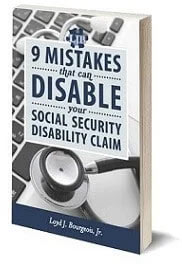Social Security has a listing for intellectual disabilities—Listing 12.05—which, if met, can qualify a person for SSDI or SSI benefits.
As a Louisiana Social Security disability lawyer, I know some people may meet this listing while not necessarily fitting the societal definition of intellectual disability.
The listing provides four separate ways for a person to be listed as intellectually disabled. If you meet any of these ways, you may be granted SSDI and/or SSI benefits.
However, even if you meet one of the four listed ways to qualify, you must also prove that your impairment started before you were 22. This is mandatory.
The four ways listed to show intellectual disability are:
- Mental incapacity evidenced by dependence upon others for personal needs (e.g., toileting, eating, dressing, or bathing) and inability to follow directions, such that the use of standardized measures of intellectual functioning is precluded; or
- A valid verbal, performance, or full-scale IQ of 59 or less; or
- A valid verbal, performance, or full-scale IQ of 60 through 70 and a physical or other mental impairment imposing an additional and significant work-related limitation of function; or
- A valid verbal, performance, or full-scale IQ of 60 through 70, resulting in at least two of the following:
- Marked restriction of activities of daily living; or
- Marked difficulties in maintaining social functioning; or
- Marked difficulties in maintaining concentration, persistence, or pace; or
- Repeated episodes of decompensation, each of extended duration.
An important note is that the listing does not require a medical diagnosis of an intellectual developmental disorder. The most common of the four ways to meet the listing, at least at the hearing level, is 12.05C. To meet the requirements of Listing 12.05C, you must show:
- A valid verbal, performance, or full-scale IQ of 60 through 70; and
- An onset of the impairment before age 22; and
- A physical or other mental impairment imposing an additional and significant work-related limitation of function.
I cannot stress the importance of developing sufficient evidence to establish that the impairment began before you were 22 years old. Records that may help you establish the required impairment before age 22 include your school or educational records, especially if you were in special education classes or did not finish high school.
You must also establish that you have an IQ score between 60 and 70 (verbal, performance or full-scale). Sometimes your school records will have this information. Other times you may have to obtain an IQ test from a qualified tester, like a psychologist.
The third thing you need to establish under listing 12.05C is that you have another physical or mental limitation that imposes significant limitations on your work capacity. To qualify as a “physical or mental impairment,” the condition must be “an impairment that results from anatomical, physiological, or psychological abnormalities which are demonstrable by medically acceptable clinical and laboratory diagnostic techniques.” A physical or mental impairment must be established by medical evidence consisting of signs, symptoms, and laboratory findings, not only by your statement of symptoms.
To meet the severity requirement, your impairment must be “of such severity that you are not only unable to do your previous work but cannot, considering your age, education, and work experience, engage in any other kind of substantial gainful work.”
Some characteristics that may signal that you meet listing 12.05 include:
- Inability to read or write.
- Attendance at special education classes in school.
- Failing one or more grades in school.
- Difficulty remembering simple information—birthday, address, phone number, etc.
- History of many jobs, each lasting for a short period of time.
If you believe that you may meet the requirements for disability based upon Listing 12.05, you should probably get an attorney or friend to help you through the process. This is a confusing and difficult system for even attorneys to navigate. If you have any questions, you can contact disability attorney Loyd Bourgeois at 985-240-9773.




